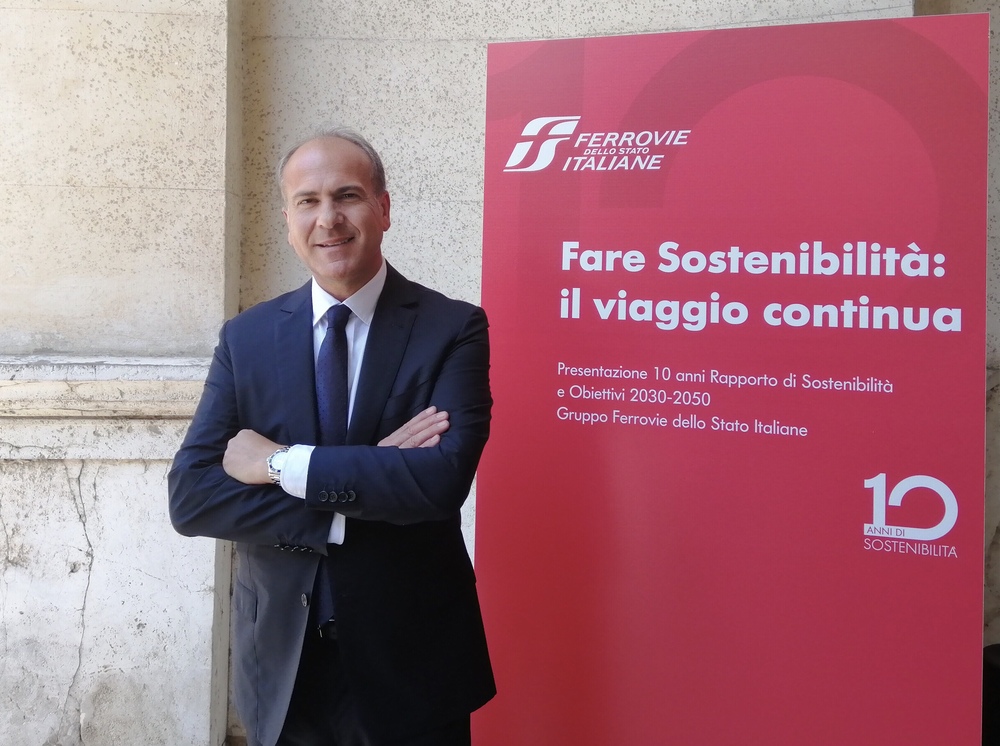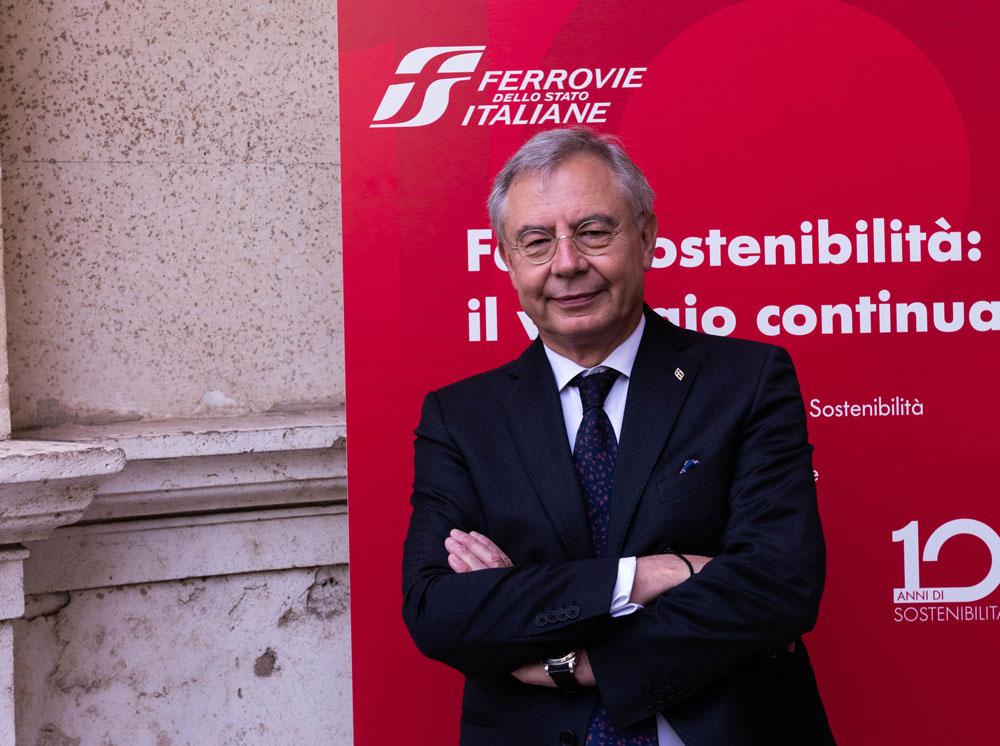Ten years of significant results in Sustainability
Over 55 billion euro has been invested to improve infrastructure and services; around 20 million fewer tonnes of CO2 emitted into the atmosphere, with people opting for the train over private vehicles; 18.5 million hours saved in travel time, being reduced by 25% thanks to high speed; 80 billion euro distributed to stakeholders (for the purchase of goods and services, paying wages, remuneration to financiers and the payment of taxes and dues).
These are the results of FS Italiane's commitment in the decade from 2008 to 2018 to realising an integrated mobility project able to contribute to the development, connectivity and sustainability of transport throughout the country. This ten-year journey was aimed towards the future to promote and support sustainable development in Italy. The commitment continues with the definition of three long-term objectives (2030-2050): increase the modal shift for passengers and freight towards sustainable mobility; increase network rail, road and motorway safety to maximum levels; reduce CO2 emissions so as to become carbon neutral by 2050.
Today in Rome's Roman Aquarium and House of Architecture, Ferrovie dello Stato Italiane presented the ten years of the Sustainability Report and the Group's 2030-2050 objectives. In attendance were Danilo Toninelli as Minister of Infrastructure and Transport, Gianluigi Castelli as President of FS Italiane and Gianfranco Battisti as Chief Executive Officer of FS Italiane.
Since 2008, FS Italiane has increasingly strengthened its commitment to transforming shared and collective mobility throughout Italy, anticipating future challenges and creating long-term value for the national system. In this context, the 2019-2023 Business Plan integrates the principles of social, environmental and economic sustainability, aimed towards offering personalised and quality services to people. The ten years of the Sustainability Report coincide with the tenth anniversary of the High Speed System, the most significant infrastructure project realised in Italy since the post-war period, along with the Milan-Napoli A1 Motorway, which has radically changed the travel habits of Italians.
FS Italiane has joined the United Nations Global Compact, of which it shares in and supports the fundamental principles of human rights, labour standards, environmental protection, transparency and the fight against corruption. The Group is also involved in achieving the 17 Sustainable Development Goals adopted by the United Nations General Assembly on 25 September 2015, with the 2030 Agenda, page 2. Indeed, the Group investments between 2008 and 2018, in addition to improving the services and the security of the infrastructure, have served to transform stations into intermodal hubs, able to meet growing needs of people.
In particular, in regards to safety, accidents on the national railway network throughout 2018 diminished by 75% compared to 2008, with 70% fewer accidents in the workplace and an incidence index less than 50%. The people — passengers and rail workers — to whom FS Italiane's 2019-2023 Business Plan pays particular attention, represent the Group's great heritage. Compared to 2008, the overall passenger satisfaction level increased by 20% also due to the activation of the customer care service focused on commuters aboard the train and in the station.
FS Italiane is constantly committed to enhancing its employees, investing in vocational training. Indeed, more than 570,00 hours of training were provided in 2018 alone, whilst the experimental phase of smart-working commenced in 2017. Sustainable finance instruments have also been successfully utilised. FS Italiane was the first railway operator in Europe to issue green bonds for the purchase of new trains with high energy efficiency and with recyclability percentages exceeding 90%. FS Italiane Group's commitment to sustainability is projected to the future. Since 2013, the Group has involved stakeholders in defining proposals for improvements to the social, economic and environmental responsibility. The Panel promoted in 2018 by FS Italiane's Sustainability Committee saw the involvement of key stakeholders who concretely contributed to determining the Group's three 2030-2050 Goals on the topics of sustainable mobility, energy and emissions, and safety. In addition, for the first time this year, the Group has adopted a Sustainability Policy to guide the activities of all its companies.
Gianfranco Battisti, Chief Executive Officer of FS Italiane

«The results achieved in the last ten years within the field of sustainability and the 2030-2050 Goals confirm FS Italiane Group's commitment to rendering collective and shared mobility increasingly integrated and sustainable. Our commitment is to improve the quality of life for people and the territories.
These are successes we have achieved by investing over 55 billion euro in services, infrastructure safety and turning stations into intermodal hubs that meet people's needs. It is a new fundamental vision to promote the development of the country and create value across a broad horizon.
With this in mind, we strive each day to increasingly integrate the principles of environmental, social and economic responsibility into the Group's industrial strategies, with great focus on the impact on the planet and on people, as well as on the economic and financial results.
Sustainability is one of the pillars of the 2019-2023 Business Plan, which will make a major contribution to economic growth in Italy, with a total investment of 58 billion euro throughout the five years.
Throughout the Plan, it is expected that about 90 million more people will opt for the train for their work, study, leisure and tourism travels, with 600 million fewer kilograms of CO2 emitted in the atmosphere and 400 thousand fewer cars on the roads.».
Gianluigi Castelli, President of FS Italiane

«Sustainability is an increasingly topical issue for large industrial groups and companies. As an FS Italiane Group, in 2008 we set out on a path that today reaches a significant milestone, the ten years of the Sustainability Report, and which simultaneously projects us into the future with the 2030-2050 Goals.
This path has allowed us to improve the Group's performance and to involve more stakeholders in order to realise the project of shared and integrated mobility.
The new contexts with which we interact each day, being increasingly dynamic and multiform, require us to anticipate the future challenges and simultaneously involve a radical change of mentality in employees, stakeholders and suppliers.
Only with the active collaboration of those who contribute to the economic, political and social life of the country shall it be possible to achieve the long-term objectives we have defined.
In this context, the Union Internationale des Chemins de Fer, which I chair through the UIC Low Carbon Rail Transport Challenge, proposed at the 2014 Climate Summit in New York, is committed to reducing CO2 emissions and rendering mobility increasingly sustainable.»